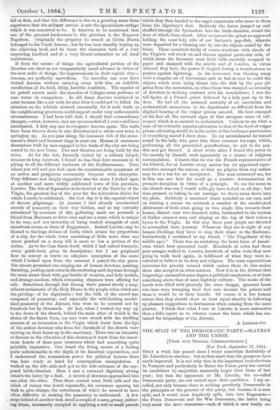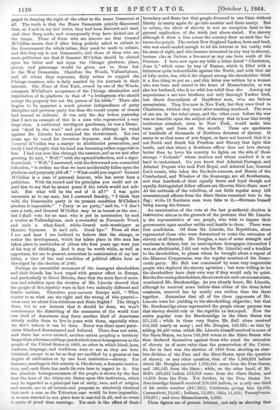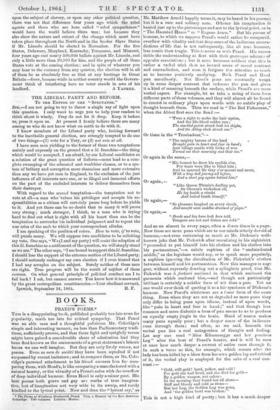THE SPLIT OF THE DEMOCRATIC PARTY—SLAVERY AND THE UNION.
[FROM OUR SPECIAL CORRESPONDENT.]
New York, September 17, 1864. ONLY a week has passed since I wrote somewhat doubtfully of Mr. Lincoln's re-election ; but in that short time his prospects have much improved. It is not only that in the important local elections in Vermont and particularly in Maine the Union party has carried its candidates by majorities materially larger than those of last year; but that the opponents of Mr. Lincoln, the so-called Democratic party, are not united upon their candidaie. I say w- eaned, not only because there is nothing peculiarly Democratic in the principles or the practice of this party, but because it is now split, and it would seem hopelessly split, into two fragments— the Peace Democrats and the War Democrats, the latter being very much the more numerous—each of which is now busily en- gaged in denying the right of the other to the name Democrat at all. The truth is that the Peace Democrats quickly discovered that, as I said in my last letter, they had been flattered and used, and then flung aside, and consequently they have kicked out of the trac,es. Those of them who are sincere see that General M'Clellan means that if after being politely asked to submit to the Government the rebels refuse, they must be made to submit, and this they say is not Democratic, and those of them who are mere politicians see that if General M'Clellan should be elected upon his letter and not upon the Chicago platform, place, power, and patronage would be given not to them but to the War Democrats. Therefore the Woods, Vallandigham, and all whom they represent, flatly refuse to support the Chicago nominee, who is daily assailed by the journals in their interest. The News of New York, owned by one of the Woods, compares M'Clellan's acceptance of the Chicago nbmination and repudiation of its platform to that of "a bridegroom who should accept the property but not the person of his bride." There also begins to be apparent a much greater independence of party discipline and previous party ties than the recent course of events had seemed to indicate. It was only the day before yesterday that I met an example of this in a man who represented a very large class. A cultivated, intelligent gentleman, he was a Demo. crat "dyed in the wool." and yet one who although he voted against Mr. Lincoln has sustained the Government. Yet two years ago he voted for Governor Seymour, and thought that General M'C]ellan was a martyr to Abolitionist persecution, and lately I had thought that his head was becoming rather copperish in hue. I had not seen him through the summer, and as we met after greeting he said, " Well?" with the upward inflection, and a signi- ficant look. " Well," I answered, with the downward non- committal inflection, "it strikes me that we have accidentally fallen upon the platform and purposely slid off." "What could you expect? General M'Clellan is a man of personal honour, who has never been a politician. With his record and his principles you could not ex- pect him to say that he meant peace if the rebels would not sub- mit. But what will be the end of it all ?" I was quite uncertain as to my man, but I answered frankly, "I think that with the Democratic party in its present condition M'Clellan's election is impossible." "Party or no party," said he, "I don't care a rush, and General M'Clellan may be as honest as the sun ; but I shall vote for no man who is put in nomination by such a traitor as Vallandigham, such a scoundrel as Fernando Wood, and such a whey-faced, white-livered mob-worshipper as Horatio Seymour. It isn't safe. Good bye." From all that I see and hear I am inclined to believe that the change, or rather the development, which has taken place in this man has taken place in multitudes of others who four years ago were just of his way of thinking. And it may be worth while, as well as opportune, for me to present, somewhat in continuation of my last letter, a view of the real condition of political affairs here as developed by the election of 1660.
Perhaps no untruthful statement of the insurgent slaveholders and their friends has been urged with greater effect in Europe, and particularly in Great Britain, than that the mere fact of seces- sion and rebellion upon the election of Mr. Lincoln showed that the people of th's republic were in fact two radically different and hostile nations. Therefore poeo-curante Europe said, "What matter to us what are the right and the wrong of this quarrel— what care we about Constitutions and State Rights ? The thing's done, it's to our interest that it should be done, we won't countenance the disturbing of the commerce of the world that one kind of Americans may force another kind of Ammicans utterly unlike them to live in peace with them, especially when we don't believe it can be done. Never was there more perni- cious falsehood disseminated and believed. There does not exist, and there has never existed, another nation peopling a territory larger than a German cabbage-patch which was so homogeneous as the people of the United States in 1860, no other in which blood, laws, customs, language, and traditions were or are as they are here identical, except in so far as they are modified by a greater or less degree of cultivation or by one local institution—slavery. For instance, marriage in this country is, like slavery, a domestic institu- tion, and each State has made its own laws in regard to it. But the absolute homogeneousness of the people is shown by the fact that the laws of the thirty-six States upon this institution, which may be regarded as a principal test of unity, race, and of religion and morals, are to all intents and purposes so absolutely identical that such a case as the Yelverton case would be here impossible. A woman married in one place here is manied in all, and no event is easier of proof than marriage. Yet such is the effect of State boundary and State law that people divorced in one State without liberty to marry again do go into another and there marry. But to return, the effect of slavery is not an exception fatal to the general application of the truth just above stated. For slavery although it drew a line across the country drew no such line be- tween the people. The veriest New England Yankee, born and bred, who was small-souled enough to let his interest or his vanity rule his sense of right, and who became interested in any way in slavery, became also as furious a fire-eater as any one born south of the Potomac. I have now upon my table a letter dated "Charleston, June 5," which came by way of Nassau, which is filled with a bitterness quite indescribable against the North, and with that air of lofty scorn, too, which the elegant among the slaveholders think it a fine thing to put on ; and this letter was written by a woman who was born and reared in the heart of Massachusetts, as was also her husband, who is no whit less rabid than she. Among my acquaintanc s are two brothers, not only thorough Yankee bred, but direct descendants of Mayflower men, who are furious secessionists. They live now in New York, but they once lived in Charleston, whither they went after reaching manhood. The sons of one are in the rebel army, and the other even before the war was so irascible upon the subject of slavery that to hear that lovely institution attacked, even in New York, would make him turn pale and foam at the mouth. These are specimens of hundreds of thousands of Northern devotees of slavery. It seems to us that some of you forget, or have not learned, that it is not North and South but Freedom and Slavery that fight this battle, and that where a Southern officer does not love slavery better than he loves his country he fights on the side of those strange " Federals" whose motives and whose conduct it is so hard to understand. Do you know that Admiral Farragut, and Admiral Dupont who took Port Royal, and Admiral Lee, General Lee's cousin, who takes the blockade-runners, and Morris of the Cumberland, and Winslow of the Kearsarge, are all Southerners, and that hundreds of their equally brave and loyal though not equally distinguished fellow officers are likewise Slave-State men ? At the outbreak of the rebellion, of our little regular army 133 commissioned officers from the Slave States remained true to the ,lag; while 19 Northern men were false to it,—Sherman himself being among the former.
An examination of the vote at the last presidental election is instructive also as to the grounds of the pretence that Mr. Lincoln is the representative of one people, who wish to impose their government upon another unlike and hostile to them. There were four candidates. Of these Mr. Lincoln, the Republican, alone represented those who were determined to resist the extension of slavery at all hazards. Mr. Douglas, a man of some strength and readiness in debate, but an unscrupulous demagogue (remember I was no abolitionist, I did not vote for Mr. Lincoln) and a truckler to the slaveholders, to please whom he brought about a repeal of the Missouri Compromise, was the regular nominee of the Demo- cratic pasty. Mr. Bell was nominated by some very respectable people who deplored the slavery agitation ; but were willing to let the slaveholders have their own way if they would only be quiet. But the fire-eating slaveholders, the avowed out-and-out secessionists, nominated Mr. Breckenridge. As you already know, Mr. Lincoln, although he received more ballots than either of the three latter nominees, received less by nearly one million than the three together. Remember that all of the three opponents of Mr. Lincoln were for yielding to the slaveholding oligarchs; but that Mr. Breckenridge alone represented the people whose purpose was that slavery should rule or the republic be decroyed. Now the entire popular vote for Breckenridge in the Slave States was 571,135 ; while in those very States Mr. Bell alone received 515,953 nearly as many ; and Mr. Douglas, 163,525; so that by adding 26,430 votes, which Mr. Lincoln himself received in some of the Slave States, we have 705,908 voters in the Slave States who then declared themselves against those who rated the extension of slavery as of more value than the preservation of the Union. So far in fact was the election of 1860 from showing an abso- lute division of the Free and the Slave States upon the question of slavery, or any other question, that of the 1,365,976 ballots which Mr. Douglas received 1,202,451 came from the Free States, and 163,525 from the Slave ; while, on the other hand, of Mr. Bell's 590,631 ballots 515,953 came from the Slave States, and 74,678 from the Free. Yet further, in the Free States Mr. Breckenridge himself received 276,818 ballots, or nearly one-third of his entire number (847,953), California giving him 34,334, Connecticut, 14,641; Indiana, 12,295; Ohio, 11,405; Pennsylvania, 178,871 ; and even Massachusetts, 5,939.
These figures are of present interest, not only as showing that upon the subject of slavery, or upon any other political question, there was not that difference four years ago which the rebel agents and those who are here called "rebel sympathisers" would have the world believe there was; but because they also show the nature and extent of the change which must have taken place throughout the North and in the border Slave States if Mr. Lincoln should be elected in November. For the five States, Delaware, Maryland, Kentucky, Tennessee, and Missouri, four years ago cast nearly 500,000 ballots against Mr. Lincoln, and only a little more than 20,000 for him, and the people of all these States vote at the coming election ; and in spite of whatever you may hear to the contrary from any quarter, the election will in all of them be as absolutely free as that at any hustings in Great Britain—freer, because while in neither country would the Govern- ment think of interfering here no voter stands in awe of his
































 Previous page
Previous page